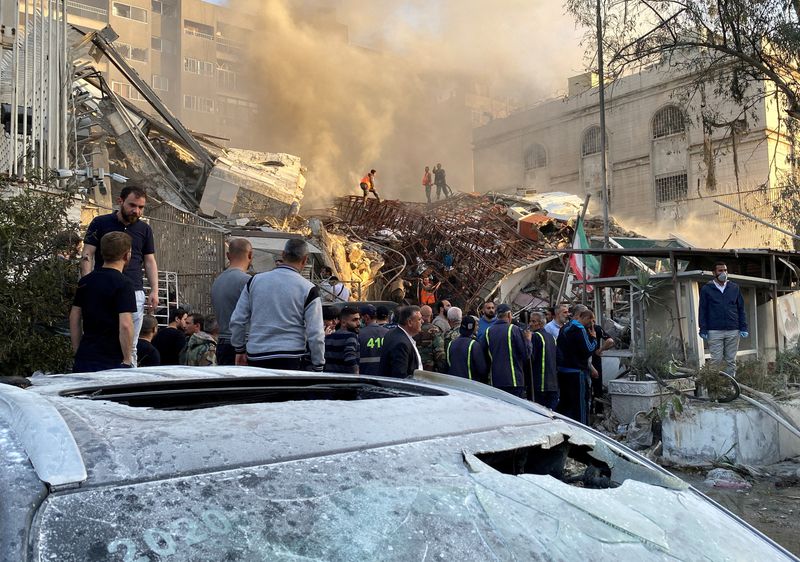DAMASCUS (Reuters) -Suspected Israeli warplanes bombed Iran's embassy in Syria on Monday in a strike that Iran said killed seven of its military advisers, including three senior commanders, marking a major escalation in Israel's war with its regional adversaries.
Reuters reporters at the site in the Mezzeh district of Damascus saw emergency workers clambering atop rubble of a destroyed building inside the diplomatic compound, adjacent to the main Iranian embassy building. Emergency vehicles were parked outside. An Iranian flag hung from a pole by the debris.
"We strongly condemn this atrocious terrorist attack that targeted the Iranian consulate building in Damascus and killed a number of innocents," said Syrian Foreign Minister Faisal Mekdad who was seen at the site along with Syria's interior minister.
Iran's ambassador to Syria said the strike hit a consular building in the embassy compound and that his residence was on the top two floors.
Iran's Islamic Revolutionary Guard Corps said in a statement that seven Iranian military advisers died in the strike including Mohammad Reza Zahedi, a senior commander in its Quds Force, which is an elite foreign espionage and paramilitary arm.
Israel has long targeted Iran's military installations in Syria and those of its proxies, but Monday's attack was the first time Israel hit the vast embassy compound itself.
It has ramped up those strikes in parallel with its campaign against Iran-backed Palestinian group Hamas, which ignited the Gaza war with an Oct. 7 attack on Israel that killed about 1,200 people and took 253 hostage, according to Israeli tallies.
More than 32,000 Palestinians have been killed in Israel's offensive in Gaza, according to Palestinian health authorities.
Israel' military has escalated airstrikes in Syria against Iran's Islamic Revolutionary Guard Corps and the Iranian-backed Lebanese armed group Hezbollah, both of which support Syrian President Bashar al-Assad.
Israel typically does not discuss attacks by its forces on Syria. Asked about the strike, an Israeli military spokesperson said: "We do not comment on reports in the foreign media".
The New York Times cited four unnamed Israeli officials as acknowledging Israel had carried out the attack.
Iran's U.N. mission described the strike as a "flagrant violation of the United Nations Charter, international law, and the foundational principle of the inviolability of diplomatic and consular premises."
Saying the strike was "a significant threat to regional peace and security," the Iranian mission urged the U.N. Security Council to condemn the attack and said Tehran reserved the right "to take a decisive response."
Hezbollah, the Lebanese group seen as Iran's most powerful armed proxy in the region, vowed to retaliate. "This crime will not pass without the enemy receiving punishment and revenge," the group said in a statement.
Muslim nations including Iraq, Jordan, Oman, Pakistan, Qatar, Saudi Arabia and the United Arab Emirates also condemned the attack, as did Russia.
Earlier, Iran's ambassador to Syria Hossein Akbari, who was unharmed, told Iranian state TV that five to seven people, including diplomats, were killed and Tehran's response would be "harsh".
Iranian state media said Tehran believed Zahedi was the target of the attack. His deputy and another senior commander were also killed along with four others.
Iran's Arabic Language Al Alam Television said that Zahedi was a military adviser in Syria who served as the head of the Quds Force in Lebanon and Syria until 2016.
REGIONAL TENSIONS
U.S. State Department spokesperson Matthew Miller said Washington remained "concerned about anything that would be escalatory or cause an increase in conflict in the region" but did not expect the strike to affect talks on freeing Israeli hostages held by Hamas.
Iran's Foreign Minister Hossein Amirabdollahian said on Tuesday a Swiss diplomat representing U.S. interests in the country was summoned by Tehran to emphasize the responsibility of Washington in the attack.
"An important message was sent to the American government as a supporter of the Zionist regime (Israel). America must give answers," Amirabdollahian said in a post on X.
According to Axios citing a U.S. official, Washington told Tehran it "had no involvement" or advanced knowledge of the Israeli strike.
Analysts were divided whether the attack on the Iranian embassy compound would spark significantly greater violence.
Jon Alterman of Washington's CSIS think tank, said the attack probably reflected Israel's belief that such strikes are deterrents and make a wider conflict less, rather than more, likely.
"The Israelis are convinced that if they seek to hang back, the threat will grow and not diminish," he said. "They are persuaded that as long as they do something like this periodically, their adversaries will be deterred."

However, Steven Cook, an analyst at the Council on Foreign Relations in Washington, saw potential for escalation.
"The IRGC can loosen restraints on proxies in Iraq and Syria, placing American forces in jeopardy again," he said. "The Iranians could also direct Hezbollah to escalate its attacks on Israel, which have been growing bolder and more numerous."